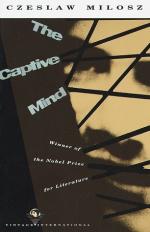
|
| Name: _________________________ | Period: ___________________ |
This test consists of 5 multiple choice questions, 5 short answer questions, and 10 short essay questions.
Multiple Choice Questions
1. Milosz illustrates Ketman with the example of what person?
(a) A Shiite theologian.
(b) An average housewife.
(c) A communist.
(d) A Muslim.
2. Walking in the ruined city in 1945, what emotion did Alpha feel primarily?
(a) Sadness.
(b) Anger.
(c) Despair.
(d) Confusion.
3. In the eyes of the besieged Pole, what is the only poetry that will last?
(a) Poetry that has most affected the writer.
(b) Poetry that is most vivid to the reader.
(c) Poetry that is most amusing.
(d) Poetry that is unquestionably real.
4. The Ketman of revolutionary purity holds that a tyrant's reign may be justified in what circumstances?
(a) For a brief period of time.
(b) If he brings the nation out of its troubles.
(c) In extreme historical circumstances.
(d) If he cannot be deposed.
5. Cosmopolitanism, as defined by communism, is what thought?
(a) Admiration for the Western bourgeois cultures.
(b) Fear of the Western bourgeois cultures.
(c) Admiration for all cultures.
(d) Admiration for all countries in the communist bloc.
Short Answer Questions
1. After the war, how was Alpha was received by Polish communists?
2. The "accidental unmaskings of Ketman," Chapter 3, are called _________ .
3. Multi-Bing pills establish ________ foundations rather than _________ .
4. As explained in Chapter 1, if a man asks the questions to which the absurd leads him, he reaches what emotional state?
5. Art and literature of the party prove to the intellectual that what is true about the world?
Short Essay Questions
1. What advantages does the Center gain with the idea of "cosmopolitanism"?
2. The East uses talented artists to their full ability, yet sometimes with mediocre results. Why does this happen?
3. Is Ketman necessary to the citizen of the New Faith? Why?
4. .How did Alpha become a more religious writer when he turned away from Christianity?
5. How does Alpha's hunger for purity and strong heroic characters prepare the way for the New Faith? Could he have gone any other way?
6. As the new way comes into power, it cannot eradicate the old way all at once. Why not?
7. Why, according to party policy, can there be no contradictions in the minds of Soviet citizens?
8. Why, in the end, could Alpha make only one decision about joining the party?
9. Why is cosmopolitanism linked to nationalist concerns? What does the center gain by connecting these?
10. How does Ketman create pride in the man who practices it?
|
This section contains 1,019 words (approx. 4 pages at 300 words per page) |

|




